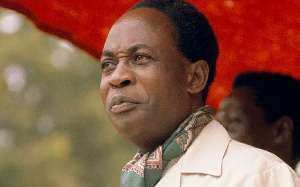 Kwame Nkrumah is the first Prime Minister and President of Ghana
Kwame Nkrumah is the first Prime Minister and President of Ghana
The Convention People’s Party (CPP) has said Ghana’s economy is struggling under this administration.
The party believes that no other government apart from the government of Dr Kwame Nkrumah ah has been able to develop the local economy.
A statement released by Chairperson and Leader of CPP, Nana Akosua Frimpomaa Sarpong Kumankuma, said “Ever since the unfortunate coup d’etat of February 24, 1966, that overthrew the CPP government of Dr Kwame Nkrumah, successive governments have lost control of the levers of the economy to the extent that we are now a client nation to the World Bank IMF and other Western creditor nations.
“With the state in control of the commanding heights of the economy, the CPP government of Dr Kwame Nkrumah launched the celebrated 7-year development plan in 1963 which saw the establishment of almost all the legacy projects in Ghana today, from the Tema Oil Refinery (TOR) to the Ghana Atomic Energy Commission, Ghana State Farms Corporation, Akosombo Dam, GIHOC Industries, Ghana State Housing Corporation, State Construction Corporation etc,
all in 3yrs, before the coup.
“This led to the massive expansion of industry and jobs in Ghana that has never been replicated to this day. Petty debates about what Nkrumah did or did not do, without acknowledging the failures of the current economic system to meet the needs of Ghana is the last thing we need. “
What is of merit, however, is a discussion about the fundamental guiding principles of this country. Our development has been staggered because our economic and social policies are not cohesive.
It is time to move our political debates away from partisan and personalistic based discussions to programmatic evaluations of the vision we hold for Ghana and the best path to achieve that vision to blame the CPP and President Kwame Nkrumah for the collapse of the Ghanaian economy, or a lack of vision, therefore, is a clear miss understanding of their reality.
“Ghanaians must understand that apart from the United States, all the states in Europe and elsewhere have used the state enterprises system, as a first step towards building up their economies. Indeed, until Margaret Thatcher, the former Prime Minister of Great Britain assumed political power, the commanding heights of the British economy where in state hands. These included British Steel & Mining, British Telecom, British Water, British Gas, aircraft manufacturing, etc.
“Also, the People’s Republic of China until 1986, run a command economy under the Communist regime. This put the government in the driving seat of the economy ensuring that capacities in the entire productive sectors were in the hands of the state.
“This helped nurture and empower the people in the acquisition of knowledge, technology, and finance; the three major parameters governing wealth creation in the 21st century. Indeed, it is on record that 70% of all industries in Malaysia where initially established by the State and subsequently denationalized in Private-Public Partnerships.
“Since 1966 to date, successive governments of Ghana allowed the World Bank, the IMF, and other Western creditor nations to structure the context within which their client, Ghana, formulated her economic policy. The disaster of an economy that we have in Ghana today is a result of the debilitating advice of the IMF and World Bank etc.
Ghanaians must juxtapose the performance of the CPP government to that of the UP/NPP, and the (P) NDC approach which abandoned, indeed purposefully truncated the gains Ghana made under the CPP’s 7-year development plan and replaced it with the unbridled capitalism we see today.
“The (P) NDC and UP/NPP have together, shut down and sold off most of the productive State-Owned Enterprises in the name of “the private sector is the engine of growth”. In the process, the DUOPOLY has not only broken the industrial backbone of Ghana, but indeed they have also broken the spirit of the Ghanaian youth, leaving them in a state of
hopelessness and gloom.
“Clearly, Trade Liberalization and the unbridled private sector participation has shattered our local economy and decimated local industry and the entrepreneurial spirit of Ghanaians, leaving in its wake, a certain endemic poverty that has robbed Ghanaians of their dignity.”